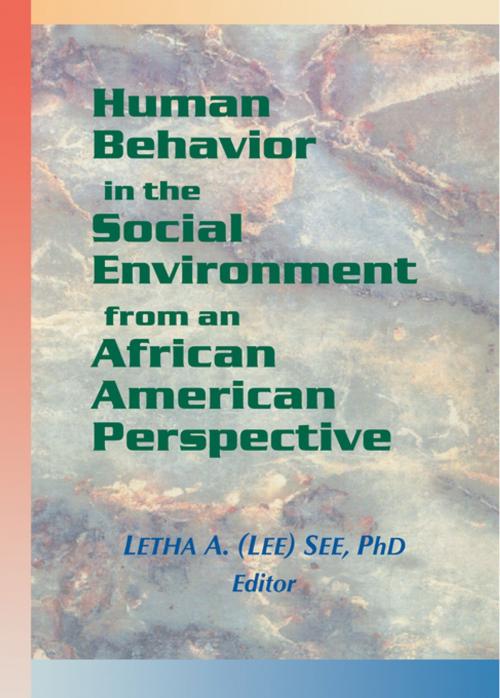Human Behavior in the Social Environment from an African American Perspective
Nonfiction, Social & Cultural Studies, Social Science, Social Work, Cultural Studies, Ethnic Studies, African-American Studies| Author: | Letha A See | ISBN: | 9781136378232 |
| Publisher: | Taylor and Francis | Publication: | April 3, 2013 |
| Imprint: | Routledge | Language: | English |
| Author: | Letha A See |
| ISBN: | 9781136378232 |
| Publisher: | Taylor and Francis |
| Publication: | April 3, 2013 |
| Imprint: | Routledge |
| Language: | English |
In Human Behavior in the Social Environment from an African American Perspective, leading black scholars come together to discuss complex human behavior problems faced by African Americans and to force the abandonment of conceptualization theories made without consideration of the Black experience. Challenging you to engage in different thinking and develop new theories for addressing the needs of African Americans, this book highlights the assets of black individuals, families, and communities and guides you through program interventions and public policies that strengthen and empower African Americans. You will learn to enhance your clients’coping strategies and resilience by factoring in their strengths rather than focusing on their weaknesses.
Human Behavior in the Social Environment from an African American Perspective contextualizes community behavior patterns, gender roles, and changing contemporary identities to challenge your assumptions about African American culture and communities and convince you to rethink your intervention strategies and methods. To further help you fine-tune your service delivery, this book leads you through discussions on:
-
help-seeking behaviors of young street males
-
the association of sociocultural risk factors with suicides
-
the use of emotive behavior therapy to help African Americans cope with the prospect of imminent death
-
advocating for changes in institutions and systems which negatively impact the lives of the poor and the oppressed
-
how social work has ignored one segment of the African American community--young girls in urban settings
-
psychological consequences of coming of age in a hostile environment
Social workers, community-based groups, policymakers, and other helping professionals owe it to their clients to shrug off culturally incompetent services and care. Using Human Behavior in the Social Environment from an African American Perspective as a guide, you will learn to redress your programs and policies with a sensitivity to the factors and mechanisms that maximize the buoyancy of disadvantaged groups over various stages of their life development.
In Human Behavior in the Social Environment from an African American Perspective, leading black scholars come together to discuss complex human behavior problems faced by African Americans and to force the abandonment of conceptualization theories made without consideration of the Black experience. Challenging you to engage in different thinking and develop new theories for addressing the needs of African Americans, this book highlights the assets of black individuals, families, and communities and guides you through program interventions and public policies that strengthen and empower African Americans. You will learn to enhance your clients’coping strategies and resilience by factoring in their strengths rather than focusing on their weaknesses.
Human Behavior in the Social Environment from an African American Perspective contextualizes community behavior patterns, gender roles, and changing contemporary identities to challenge your assumptions about African American culture and communities and convince you to rethink your intervention strategies and methods. To further help you fine-tune your service delivery, this book leads you through discussions on:
-
help-seeking behaviors of young street males
-
the association of sociocultural risk factors with suicides
-
the use of emotive behavior therapy to help African Americans cope with the prospect of imminent death
-
advocating for changes in institutions and systems which negatively impact the lives of the poor and the oppressed
-
how social work has ignored one segment of the African American community--young girls in urban settings
-
psychological consequences of coming of age in a hostile environment
Social workers, community-based groups, policymakers, and other helping professionals owe it to their clients to shrug off culturally incompetent services and care. Using Human Behavior in the Social Environment from an African American Perspective as a guide, you will learn to redress your programs and policies with a sensitivity to the factors and mechanisms that maximize the buoyancy of disadvantaged groups over various stages of their life development.















